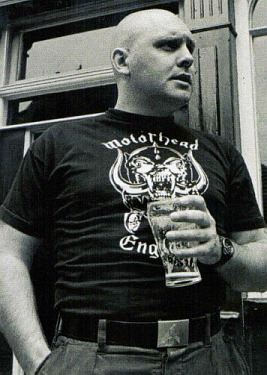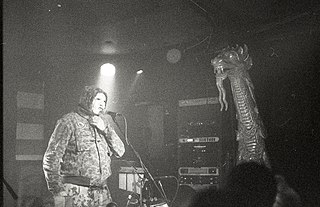Related Research Articles

Ian Stuart Donaldson, also known as Ian Stuart, was an English neo-Nazi musician. He was best known as the front-man of Skrewdriver, a punk band which, from 1983 onwards, he rebranded as a White power and Rock Against Communism band. He raised money through white power concerts with his Blood & Honour network.
Blood & Honour is a neo-Nazi music promotion network and right-wing extremist political group founded in the United Kingdom by Ian Stuart Donaldson and Nicky Crane in 1987. It is composed of White Nationalists and has links to Combat 18.
Angelic Upstarts are an English punk rock / Oi! band formed in South Shields in 1977. AllMusic calls them "one of the period's most politically charged and thought-provoking groups". The band espouse an anti-fascist and socialist working class philosophy, and have been associated with the punk and skinhead subcultures.

Sol Invictus are a British neofolk band formed by Tony Wakeford in 1987. Wakeford has been the sole constant member of the group since its inception, although numerous musicians have contributed and collaborated with him under the Sol Invictus name over the years.

Anthony Charles Wakeford is a British neofolk musician, who primarily records under the name Sol Invictus. He is also a member of the punk rock band Crisis and a co-founder of Death in June.

Ian Read is an English neofolk and traditional folk musician, and occultist active within chaos magic and Germanic mysticism circles.
White power skinheads, also known as racist skinheads and neo-Nazi skinheads, are members of a neo-Nazi, white supremacist and antisemitic offshoot of the skinhead subculture. Many of them are affiliated with white nationalist organizations and some of them are members of prison gangs. The movement emerged in the United Kingdom between the late 1960s and the late 1970s, before spreading across Eurasia and North America in the 1980–1990s.

American Front (AF) is a white supremacist organization founded in San Francisco, California by Bob Heick in 1984. It began as a loose organization modeled after the British National Front. Heick began working with Tom Metzger's White Aryan Resistance (WAR) in 1988.
Rock-O-RamaRecords was a Cologne-based German independent record label that operated between 1980 and 1994, established and run by Herbert Egoldt. Though initially dedicated to releasing and distributing left-wing or apolitical German and international punk and hardcore, Rock-O-Rama became a leading label for white power rock and Rock Against Communism from the middle of the 1980s. Following a 1993 police raid, Egoldt closed the label in 1994 under the threat of legal action from German authorities.
Skullhead was a nationalist Oi! band from the Newcastle area. It was part of the Rock Against Communism (RAC) movement.
Skrewdriver were an English punk rock band formed by Ian Stuart Donaldson in Poulton-le-Fylde, Lancashire, in 1976. Originally a punk band, Skrewdriver changed into a white power skinhead rock band after reuniting in the 1980s. Their original line-up split in January 1979 and Donaldson reformed the band with different musicians in 1982. This new version of the band played a leading role in the Rock Against Communism movement.

Crisis are an English punk rock band formed in 1977 in Guildford, Surrey. An openly left-wing and anti-fascist band, they performed at rallies for Rock Against Racism and the Anti-Nazi League, and at Right to Work marches. British music magazine Sounds used the phrase "Music to March To" to describe their controversial and radical left-wing form of music.
Rebelles Européens was a French independent record label that operated between 1987 and 1994, specialising in white power rock and Rock Against Communism. Based in the port city of Brest, the label was founded by Gaël Bodilis, a member of far-right groups including the Front Nationale Jeunesse, Troisième Voie, and PNFE. Rebelles Européens was, alongside German label Rock-O-Rama Records, a key player within the international white power skinhead music scene during the late 1980s and early 1990s. Unlike Rock-O-Rama, whose owner was apolitical and commercially minded, Bodilis primarily conceived of Rebelles Européens as a means for spreading neo-fascist ideology, and denied any interest in the profitability of his enterprise. Rebelles Europeéns was notable for its brazen inclusion of Nazi and white-supremacist symbols on album covers; Robert Forbes and Eddie Stampton suggest that the label "seemed to operate without regard to the law". After a pause on production in 1993, Rebelles Europeéns went out of business in 1994, with Australian label White League reissuing a small number of their releases on CD in 1995.
Karl Blake is a vocalist, bassist, guitarist and multi-instrumentalist. Most of his own music can be described as progressive-experimental and sometimes psychedelic.
Oi! is a subgenre of punk rock that originated in the United Kingdom in the late 1970s. The music and its associated subculture had the goal of bringing together punks, skinheads, and other disaffected working-class youth. The movement was partly a response to the perception that many participants in the early punk rock scene were, in the words of The Business guitarist Steve Kent, "trendy university people using long words, trying to be artistic... and losing touch."
No Remorse are an English white power rock band formed in London in 1985. They were one of the most prominent neo-Nazi skinheads bands of the Rock Against Communism scene. The band was led by Paul Burnley between 1986 and 1996, and by William Browning and Daniel "Jacko" Jack from 1996 onwards, following a factional dispute within British white nationalist politics.
Youth Defense League was an American Oi!/New York hardcore (NYHC) band formed in 1986.
Clark Reid Martell is an American white supremacist and the former leader of Chicago Area SkinHeads (CASH), which was founded in 1985 by six skinheads under his leadership. This was the first organized neo-Nazi white power skinhead group in the United States. The group was also called Romantic Violence, and was the first US distributor of records and tapes from the English band Skrewdriver.

Death in June are a neofolk group led by English musician Douglas P.. The band was originally formed in the United Kingdom in 1981 as a trio. However, after the other members left in 1984 and 1985 to work on other projects, the group became the work of Douglas P. and various collaborators. Over the band's four decades of existence, they have made numerous shifts in style and presentation, resulting in an overall shift from initial post-punk and industrial music influence to a more acoustic and folk music-oriented approach. Douglas P.'s influence was instrumental in sparking neofolk, of which his music has subsequently become a part.
White power music is music that promotes white nationalism. It encompasses various music styles, including rock, country, and folk. Ethnomusicologist Benjamin R. Teitelbaum argues that white power music "can be defined by lyrics that demonize variously conceived non-whites and advocate racial pride and solidarity. Most often, however, insiders conceptualized white power music as the combination of those themes with pounding rhythms and a charging punk or metal-based accompaniment." Genres include Nazi punk, Rock Against Communism, National Socialist black metal, and fashwave.
References
- 1 2 3 4 5 6 7 8 9 Robert, Forbes; Stampton, Eddie (9 November 2015). "1985". The White Nationalist Skinhead Movement, UK & USA, 1979-1993. Feral House. pp. 161–164. ISBN 9781627310253.
- 1 2 Simpson, Paul. "Sol Invictus Biography". AllMusic. Retrieved 19 March 2023.
- ↑ Robert, Forbes; Stampton, Eddie (9 November 2015). "1985". The White Nationalist Skinhead Movement, UK & USA, 1979-1993. Feral House. pp. 159–160. ISBN 9781627310253.
- ↑ Barry, Robert (3 October 2012). "FACT meets Boyd Rice: noise pioneer, film buff, leader of the Church of Satan". Fact magazine. Retrieved 20 March 2023.